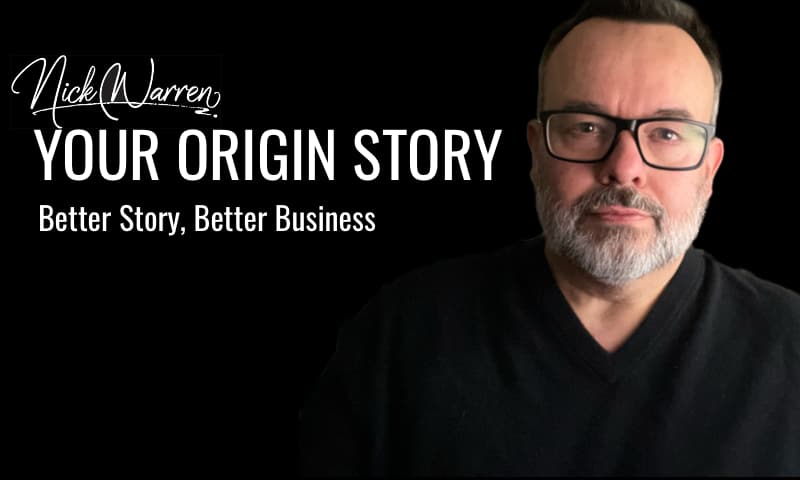As this whole site is me talking about story, I’ll add nothing here.
Don’t underestimate the power of the story. There are almost no other cues available to persuade someone to spread the word about a stock. You can’t see it or touch it or smell it—it’s just an intangible right to make money in the future. As a result, the story must be able to describe the reason why the stock is selling for x today but will be selling for 3x tomorrow.
Unleashing the Ideavirus (2000) – Seth Godin
It might be Timberland boots downtown, or Prada bags uptown. Both are ridiculously overpriced for the utility they deliver, but its the story we tell ourselves that matters, the label, the image, the peace of mind.
Small Is The New Big (2006) – Seth Godin
Great stories succeed because they are able to capture the imagination of large or important audiences.
A great story is true. Not necessarily because it’s factual, but because it’s consistent and authentic. Consumers are too good at sniffing out inconsistencies for a marketer to get away with a story that’s just slapped on.
Great stories make a promise. They promise fun, safety, or a shortcut. The promise needs to be bold and audacious. Either it’s exceptional or it’s not worth listening to.
Great stories are trusted. Trust is the scarcest resource we’ve got left. No one trusts anyone. People don’t trust the beautiful women ordering vodka at the corner bar (they’re getting paid by the liquor company). People don’t trust the spokespeople on commercials (who exactly is Rula Lenska?). And they certainly don’t trust the companies that make pharmaceuticals (Vioxx, apparently, can kill you). As a result, no marketer succeeds in telling a story unless he has earned the credibility to tell that story.
Great stories are subtle. Surprisingly, the fewer details a marketer spells out, the more powerful the story becomes. Talented marketers understand that allowing people to draw their own conclusions is far more effective than announcing the punch line.
Great stories happen fast. First impressions are far more powerful than we give them credit for. Great stories don’t always need eight-page color brochures or a face-to-face meeting. Either you are ready to listen or you aren’t.
Great stories don’t appeal to logic, but they often appeal to our senses. Pheromones aren’t a myth. People decide if they like someone after just a sniff.
Great stories are rarely aimed at everyone. Average people are good at ignoring you. Average people have too many different points of view about life, and average people are, by and large, satisfied. If you need to water down your story to appeal to everyone, it will appeal to no one. The most effective stories match the worldview of a tiny audience—and then that tiny audience spreads the story.
Great stories don’t contradict themselves. If your restaurant is in the right location but has the wrong menu, you lose. If your art gallery carries the right artists but your staff is made up of rejects from a used-car lot, you lose. Consumers are clever and they’ll see through your deceit at once.
Most of all, great stories agree with our worldview. The best stories don’t teach people anything new. Instead, the best stories agree with what the audience already believes and makes the members of the audience feel smart and secure when reminded how right they were in the first place.
Whatcha Gonna Do with That Duck?: And Other Provocations (2013) – Seth Godin
STORIES define everything you say and do.
The product has a Myth; the service has a Legend. Marketing applies to every person, every job, every service, and every organization. That’s because all we can work with as humans is stories.
I want to argue that data and stories are the two key building blocks of marketing—the other three are built on these two.
Products (and Services) are physical manifestations of the story. If your story is that you are cutting edge and faster/newer/better, then your products better be. “Average products for average people” is a common story, but not one that spreads. When in doubt, re-imagine the product. Push it to be the story, to live the story, to create a myth.
Whatcha Gonna Do with That Duck?: And Other Provocations (2013) – Seth Godin
Persistent, consistent, and frequent Stories, delivered to an aligned audience, will earn attention, trust, and action…
Culture beats strategy—so much that culture is strategy.
This Is Marketing: You Can’t Be Seen Until You Learn To See (2018) – Seth Godin
The good news is that we don’t need to rely on the shiniest, latest digital media shortcut—we have even more powerful, nuanced, and timeless tools at our disposal.
We tell stories. Stories that resonate and hold up over time. Stories that are true, because we made them true with our actions and our products and our services.
We make connections. Humans are lonely, and they want to be seen and known. People want to be part of something. It’s safer that way, and often more fun.
This Is Marketing: You Can’t Be Seen Until You Learn To See (2018) – Seth Godin
Any of these edges and stories and transformations are available to the craftsperson as soon as he decides to make a difference. Knowing that this is the story your customer tells himself is insufficient. You still have to act on it, open the door to the possibility, and organize the entire experience around that story.
This is the work that helps people understand that you are special, and this is the work that makes things better.
When you know what you stand for, you don’t need to compete.
This Is Marketing: You Can’t Be Seen Until You Learn To See (2018) – Seth Godin
See Also:
Well, storytelling is the thread that links all these pages.
| On Art | On Assets | On Attention | On Authenticity | On Average | On Branding | On Challenging Yourself | On Cliche | On Comic Books (and life) | On Criticism | On Foundations | On Humans | On Ideaviriuses | On Intangibles | On Leadership | On Marketing | On Mythology | On Niching | On Oxymorons | On Permission | On Pricing | On Selling | On Storytelling | On Your Story | On Tension | On True Lies
Or choose a path towards stories that mean business.

Explore the art and science of business storytelling. The rabbit hole goes way deeper than you think.

The Business Storytelling Glossary lists the concepts, ideas and definitions that use in my work. Your mileage will vary.

